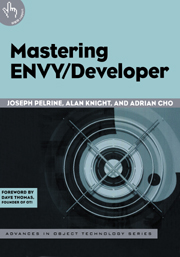Book contents
- Frontmatter
- Contents
- Foreword
- Acknowledgments
- Introduction
- Chapter 1 Getting Started
- Chapter 2 Basic Concepts
- Chapter 3 Team Development
- Chapter 4 Advanced Development
- Chapter 5 Formal Concepts
- Chapter 6 Packaging and Delivery
- Chapter 7 Extending the System
- Chapter 8 Administration
- Chapter 9 Goodies
- Chapter 10 Troubleshooting
- Appendix: A Selected Annotated API of ENVY System Classes
- Glossary
- References
- Index
Chapter 2 - Basic Concepts
Published online by Cambridge University Press: 11 January 2010
- Frontmatter
- Contents
- Foreword
- Acknowledgments
- Introduction
- Chapter 1 Getting Started
- Chapter 2 Basic Concepts
- Chapter 3 Team Development
- Chapter 4 Advanced Development
- Chapter 5 Formal Concepts
- Chapter 6 Packaging and Delivery
- Chapter 7 Extending the System
- Chapter 8 Administration
- Chapter 9 Goodies
- Chapter 10 Troubleshooting
- Appendix: A Selected Annotated API of ENVY System Classes
- Glossary
- References
- Index
Summary
Before you can start to use ENVY effectively, many questions need answering, even if you already understand Smalltalk development. How do I write code using ENVY? How is that code organized? How do I coordinate with other team members? What's a configuration map?
This chapter sorts out the basic concepts in ENVY, and starts you on the path toward being a productive developer. We start out by discussing development as an individual. In Chapter 3 we move on to team development, and Chapter 4 covers more advanced topics.
The discussion here is aimed at a new user who has at least some experience with Smalltalk development. We'll discuss not only the features but their motivations and best practices, illustrating with examples. The chapter starts out simple, but things will get complicated quickly. Be patient; it'll take some time to become familiar with all of these concepts. More experienced users will find the best practices most interesting, if only to find things they disagree with. Those users looking for a shorter, more formal description of ENVY concepts should see Chapter 5.
Questions and Answers
The example project we'll be using is a simple questionnaire application. There are questions, and there are answers. Questions are strung together into groups, and depending on the answers to one question, the follow-up questions may change. For example, suppose we asked the question, How would you rate this book? If the response was Poor, then we don't need to ask any more questions because the user clearly has bad judgment.
- Type
- Chapter
- Information
- Mastering ENVY/Developer , pp. 21 - 44Publisher: Cambridge University PressPrint publication year: 2001

